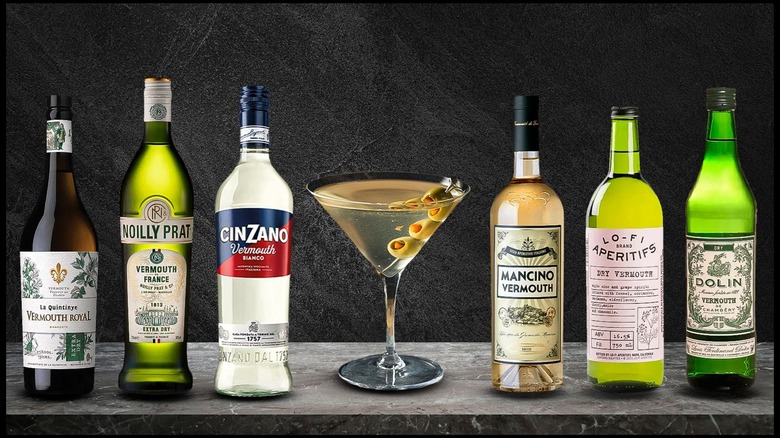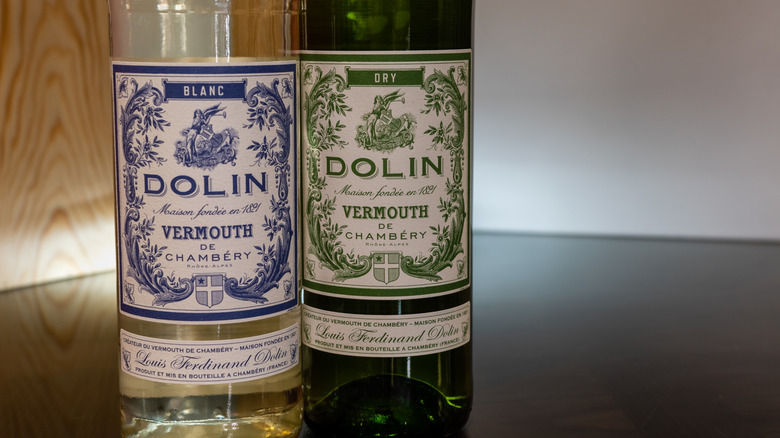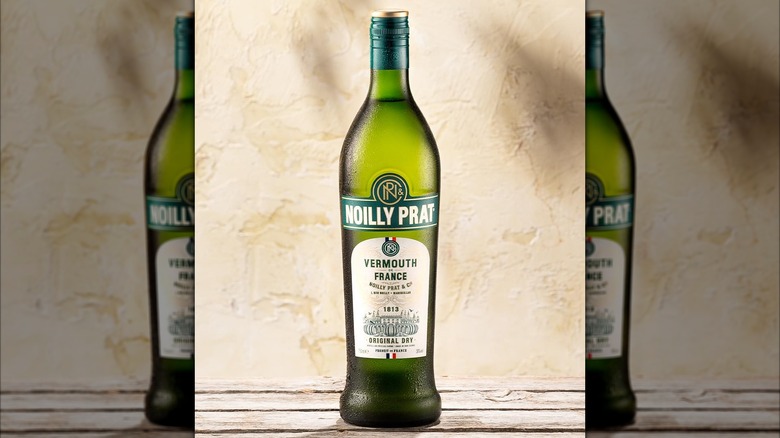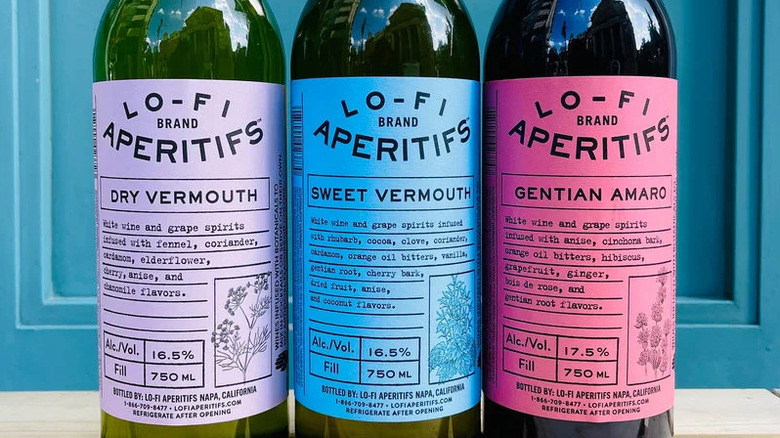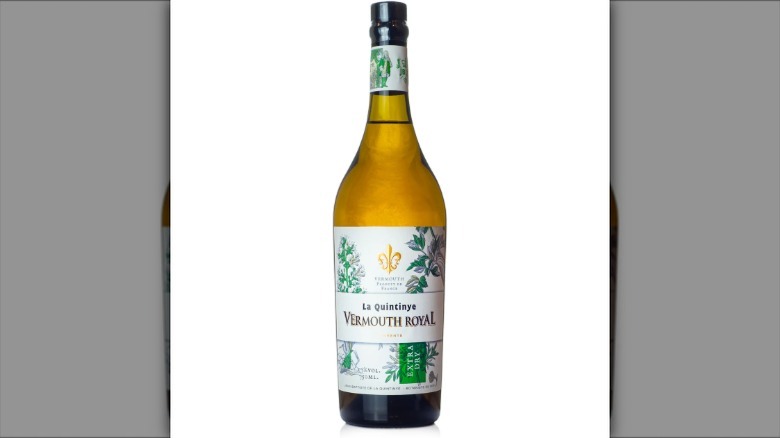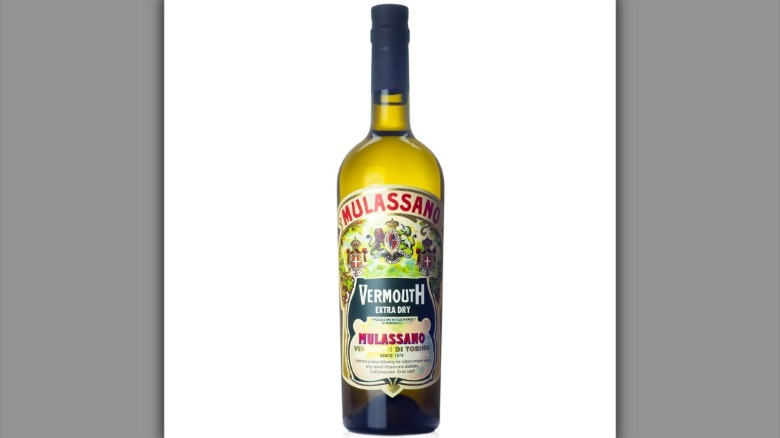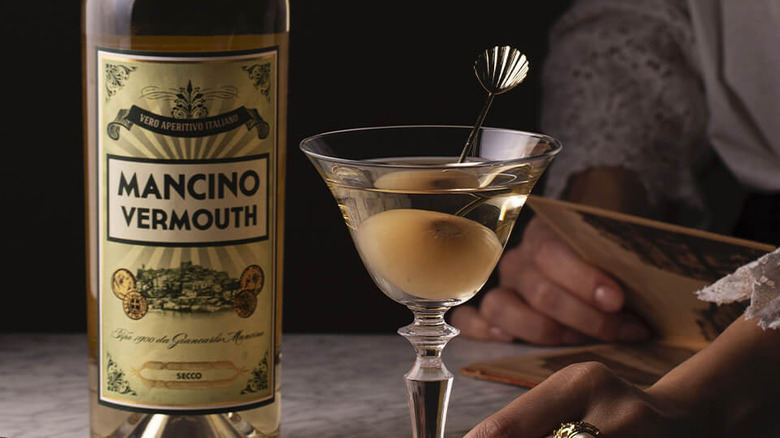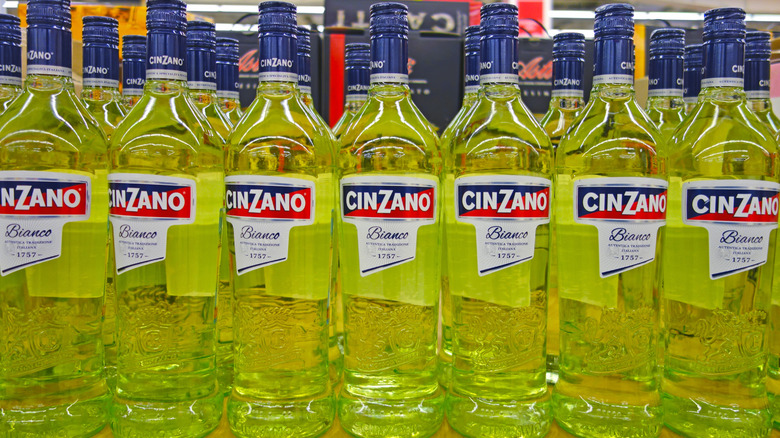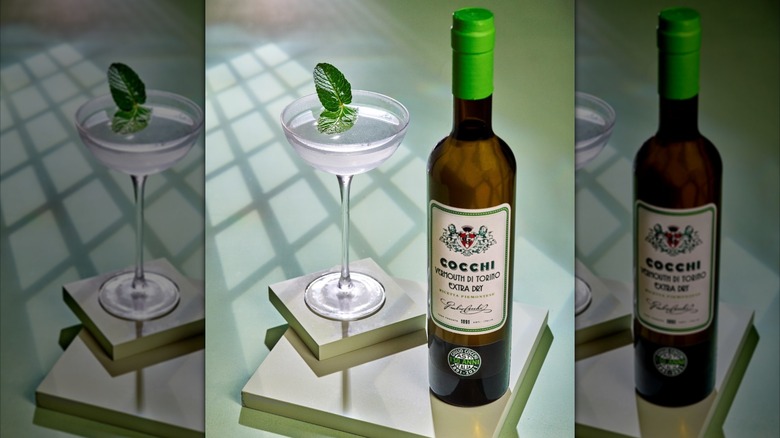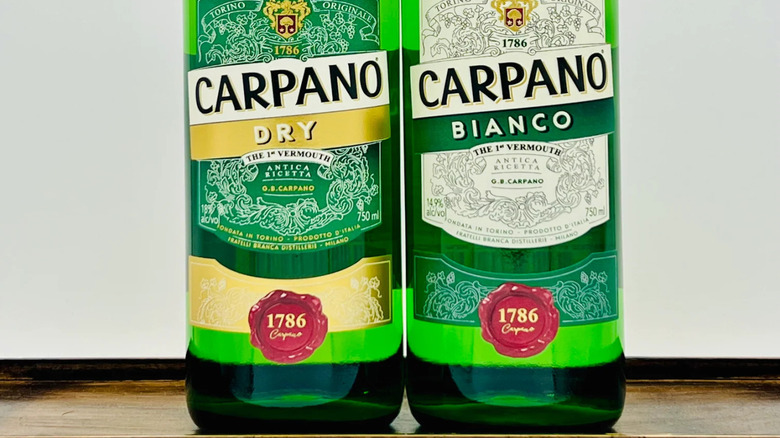9 Best Vermouth Brands For Your Martini
A classic martini is chic, understated, and delicious. With few ingredients, it's one of those drinks that requires each component be dialed to perfection to create the ultimate drink. Yes, the gin or vodka come in clutch. But, so does the vermouth. Vermouth brings a whole assortment of nuanced flavors from its unique set of botanicals, ultimately elevating your martini to the next dimension through layered complexity. If you're a dry martini person, I highly suggest you try switching it up and ask for a healthy splash of vermouth the next time you order yours. It truly will taste like a whole other drink.
So, which are the best vermouth brands out there to make an exceptional martini? There are a handful of classic and contemporary vermouth brands, each with a distinct profile that may lean a little more bitter, floral, or herbaceous. When splashed into gin, they make delightful martinis with underlying notes of the botanical-infused, fortified wine. I'm a vermouth advocate in the world of drinks (and a sommelier), so I'm pulling from my sensory training in the field to tell you about the best vermouth brands that will make an oh-so-pretty martini.
Dolin
A French vermouth brand, Dolin, has a history that dates back to the early 19th century. Wow. After seeing the fortified wine in action in its birthplace — Turin, Italy — Joseph Chavasse started making his own vermouth in the town of Chambery, France. Not long after, Dolin blossomed into one of the key vermouth producers in Europe, and to this day is a leading brand on the market. Chambery is a town in the French Alps — hence, Dolin vermouth is defined by alpine plants, flowers, and spices that grow in the Savoie. Dolin uses ugni blanc grapes and 30-plus botanicals in the maceration to infuse distinct aromas and characteristics in the vermouth.
Dolin's dry vermouth has a depth and richness to it. The hue of faded hay, this vermouth balances warm characteristics with bitter citrus, menthol, almond, and balsamic. It's complex and nuanced with an ever-so-slight sweetness that takes the edge off the gin martini, making a great dry martini. If you love the subtle medicinal characteristics of bitters, such as orange peel with spice and vanilla, try this vermouth in your next martini. The brand is high-quality, classic, and easy to find.
Noilly Prat
Yet another French vermouth brand by yet another Joseph, Noilly Prat has roots in Lyon, France, and dates back to the mid-19th century. The base of white grapes, mostly Picoult and Clairette, is aged for 12 months before the unique blend of 15-plus herbs and spices macerates with the wine for three weeks. Originally just making a traditional dry vermouth, Noilly Prat eventually expanded to make an extra dry, an amber, and a rouge. The extra dry came about to satisfy a trending market need of American martini drinkers who went through an era of wanting particularly dry martinis.
The original dry vermouth from Noilly Prat is medium-bodied with obvious light and fruity white grape characteristics and floral notes. Chamomile, elderflower, and faint iris are matched with a sweet and bitter orange, gentian root, and nutmeg. This is a great addition to a gin or vodka martini, giving body to the cocktail. The extra dry iteration is, well, drier. In addition, it has a slightly thinner mouthfeel and more obvious bitter components with similar floral characteristics. Overall, it's lighter and a bit more delicate. The intention is to incorporate more of it into your martini to make a very dry, yet very pleasing vermouth-forward martini. The brand makes great vermouth that is readily available and will definitely up your martini game, no matter which you go with. Not to mention, Noilly Prat is particularly affordable.
Lo-Fi
Lo-Fi is new to the vermouth scene, and the cool American brand hails from California. Established in 2016, it's been around long enough now to build a domestic following. The bright and catchy labels lead you to believe the brand is a bit more artisanal than it is (it's a collab with Napa's Gallo Winery), but it still delivers in quality and flavor, making it a great brand to try out for your next martini.
With a dry and sweet vermouth in its line-up, you can pick whatever profile fits your martini preferences best. Lo-Fi's dry vermouth is on the sweeter side when compared to some of the long-standing European vermouth brands, like Dolin. The faintly golden-hued spirit has a fresh fruit characteristic from the grapes with layered gentian root, bitter orange extract, coriander, elderflower, and cardamom notes. The infusion is quite delightful, and it drinks complex with a crisp finish. In comparison, the sweet vermouth has a fuller body based in oak, cocoa, and vanilla. This richness is balanced by wild cherry bark, bitter orange peel, and warming spices. The latter would make for an interesting take on a vodka martini, emboldening the neutral spirit. I would suggest making it a dirty martini by adding a small amount of salty preserved lemon brine. Whichever way you go, Lo-Fi is making some interesting and approachable vermouths right in California, so it's definitely a brand to pay attention to.
La Quintinye
La Quintinye is a versatile French vermouth by Jean-Sébastien Robicquet. It is supposedly the first vermouth to come from a combination of Pineau des Charentes (an already fortified wine) and white wine from Southwestern France. The brand has the standard three — blanc, rouge, and extra dry — all of which exhibit the terroir and utilize a unique blend of herbs, roots, and spices.
For martini purposes, you're going to want to focus on the extra dry or the blanc if you're feeling adventurous. The traditional choice of extra dry includes 27 different additions that are macerated with grape juice and Pineau des Charentes to make a light, expressive vermouth. There are obvious floral, citrus, spice, licorice, and anise notes with wormwood and rosemary ringing through. Overall, it leans savory and is crisp with a clean citrus finish, making it a great addition to either a gin or vodka martini. The blanc vermouth from La Quintinye has a combination of 18 botanical additions with a much fuller body and a richer mouthfeel, more fruit, a sweetness on the tongue, and a zing from orange and spice. While this version is a little unconventional for a martini, I'm in the drink-what-you-want camp. Feel out your flavor vibe and pick up whichever suits your palate. La Quintinye is classic for a reason, making some of the best martini-bound vermouths around.
Bordiga
Finally, repping Italy a little! It is the birthplace of vermouth, after all. Mulassano Vermouth di Torino is produced by the Bordiga distillery, which was founded in 1888 in Cuneo, Italy. Pietro Bordiga was an herbalist who took special interest in the variety of Alpine botanicals in the region. After creating a distinct recipe for his own vermouth, Caffe Mulassano in Turin approached him for the formula (hence the name for one of the vermouths).
Bordiga gives you a few options in the vermouth realm. It makes extra dry and bianco, along with the exclusive Mulassano extra dry and bianco. The Mulassano extra dry still includes a lot of hand-picked Alpine botanicals from the Cuneo Alps. A blend of Moscato Secco, Trebbiano, and Cortese gets macerated with linden, coriander, wormwood, clove berries, sage, fennel, marjoram, and many more spices and roots to achieve the special recipe. It's winey with an obvious bitter edge and underlying spice. The Mulassano white vermouth from Bordiga has a similar profile, with additional notes of mint and elderberry coming through. It's fuller-bodied with a distinct sweet profile. Between its different options, the distinctive white grapes, and the custom botanical recipe, Bordiga captures the essence of Italian vermouth. It's a great vermouth brand to search out for your next dirty martini with either gin or vodka.
Mancino
Mancino vermouth is a new brand with old Italian roots. Though it doesn't have the history that some of the other Italian and French brands have, it does find some history in its choice of regional wine and has established itself as one of the key vermouth brands around. Giancarlo Mancini has conjured up a unique recipe of botanicals, carving out a niche for himself and the brand in the world of vermouth.
The Mancino range of vermouths is quite extensive, with Secco, Sakura, Bianco Ambrato, and a few others. Each has its own distinctive characteristics, which tell a story of the hills of Piemonte and impeccable craftsmanship. The Mancino Secco gives a bit more of a savory profile with an herbaceousness that is well-suited to a gin martini. There's a zip of lemongrass and citrus peel with a whole bouquet of savory green herbs like marjoram and sage. A slight floral and spiced nutmeg adds nuance. While this is the perfect vermouth that leans into those traditional Italian characteristics, the Sakura vermouth from Mancino offers another very interesting profile that takes inspiration from both Japan and Italy. The blend of 20 botanicals in Sakura balances bitter and floral notes, and is delicate and light — a vermouth to try out for something a little bit different. Overall, the vermouths are incredibly high-quality and balanced, and the range gives you a lot to play with when crafting your perfect martini.
Cinzano
Cinzano is an old Italian brand that dates back to 1757. With roots in Piemonte, Cinzano has a long history of mastering the craft. Brothers Giacomo and Carlo Stefano studied and mastered the process, coming up with unique, expressive, timeless recipes for each of the brand's vermouths. Cinzano easily competes in the white vermouth category as one of the best.
For your martini creations, you'll be looking to use one of Cinzano's white vermouths, though there is a great red version for other cocktail uses. You'll find a plethora of vermouths to choose from. Cinzano Extra Dry is a classic pick for mixing a martini with notes of mint, sage, and subtle spice. It's crisp, clean, herbaceous, and adds a nod of complexity to your gin or vodka. The Bianco is fuller-bodied yet still delicately aromatic with a range of spice and florals, like spring orchard blossom and freshly-picked marjoram. It's delicious and layers more depth and body into your drink. The Bottega Cinzano Extra Dry leans into the classic note of Mediterranean herbs, like sage, oregano, mint, and thyme. There is a hint of floral aromatics and spice with a long bitter finish and noted wormwood. Each displays the terroir and offers up subtle nuance, which rings through in a mixed drink. The brand is quintessential Italian and one of the best around.
Cocchi
Cocchi has got to have one of the cutest names and best typefaces for its labels, but I guess that's beside the point. However, if you're a sucker for marketing, this alone might pull you in. Don't worry about judging a book by its cover — the brand offers longstanding Italian-crafted vermouths, and its assorted collection is top-notch.
The Cocchi Vermouth di Torino Extra Dry has a classic profile. With a base of Cortese grapes alongside a citrus and mint botanical infusion, it is quite crisp, fresh, and clean on the palate. A lot of pretty winey notes ring through in this one, like apple blossom and melon. It's grounded by sweet and savory herbs and spices like angelica, cardamom, and coriander, making it bright, unique, and lovely. Another edition that was introduced back in 2014 and is only made in certain years is the Cocchi Savoy Vermouth Dry. This is a collaboration between Cocchi and the bar at the London hotel, The Savoy. Specifically created to be used in martinis, this vermouth is distinct, yet can flex between a gin or vodka martini. It's dry with pleasant citrus, bergamot, gentian, and rhubarb notes, as well as a dizzying array of other botanicals. Pretty much, Cocchi has nailed the vermouth scene, and it's certainly a brand you want to give some bar cart space to.
Carpano
Carpano is likely the most quintessential Italian vermouth brand, and you'll find it on a wide variety of bar shelves for good reason. Italian herbalist Antonio Benedetto Carpano first started by combining herbs and spices with the grape, Muscatel. In the years to follow, the drink quickly grew in popularity and eventually created and defined the concept of an aperitif.
The Carpano Bianco has structure with distinct fruit, pear blossom, and apple. Overall, it's slightly sweeter than some of its competitors' dry or extra dry vermouths and therefore comes across with a bit more mouthfeel. The finish has a minerality that is quite pleasant, and there is a slight lingering bitterness. It's a particularly good vermouth for a vodka martini, adding a little depth without being too overwhelming. The Carpano Dry vermouth has less sugar, and while there is a faint sweetness, it is lighter and fresher with a bit more herbaceousness and less fruit. This is one of the most subtle dry vermouths around, making it a great option for both gin and vodka martinis. Carpano is iconic and a great option for your martini creations.
